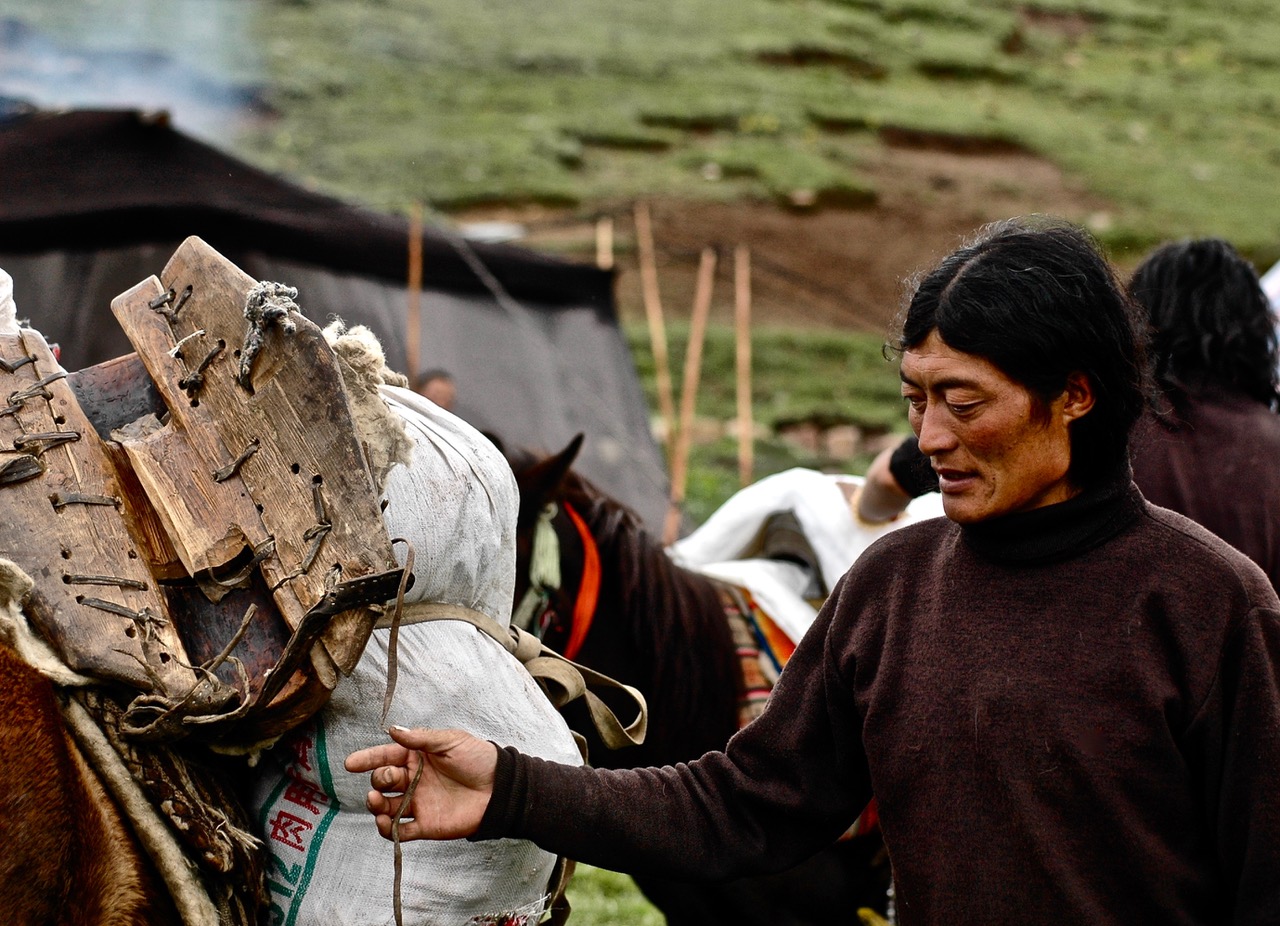A continuation of some of the embedded moments – both large and small – of our 7.5 month expedition to chart and document the Tea Horse Road.
Along the Tea Horse Road, the careful daily ritual of loading and unloading of commodities was considered an art form. Securing loads that didn’t chafe animals with too tightly bound a harness, was just as important a skill as securing it ‘just’ tightly enough that the loads didn’t tip or unbind. Here a nomadic host of our team readies our mules as we prepare one morning. It is still an honour to assist in the loading (Tibetan: “gyap’kè”) and unloading (known as “gyap’po”), upon the Tibetan Plateau and still a skill taught to young children. Many a time I’ve been politely, but firmly, shoved aside by men, women, and children as I try and contribute to the loading process. I have over the years timed locals as they competently strap commodities and gear atop yak, mules, and horses. On average they are three times faster than I’ve ever been, and their loads are far less likely to go wonky on the journey than mine. Skills of the mountains matter and so do too the codes of welcoming and farewells.


About JeffFuchs
Bio
Having lived for most of the past decade in Asia, Fuchs’ work has centered on indigenous mountain cultures, oral histories with an obsessive interest in tea. His photos and stories have appeared on three continents in award-winning publications Kyoto Journal, TRVL, and Outpost Magazine, as well as The Spanish Expedition Society, The Earth, Silkroad Foundation, The China Post Newspaper, The Toronto Star, The South China Morning Post and Traveler amongst others. Various pieces of his work are part of private collections in Europe, North America and Asia and he serves as the Asian Editor at Large for Canada’s award-winning Outpost magazine.
Fuchs is the Wild China Explorer of the Year for 2011 for sustainable exploration of the Himalayan Trade Routes. He recently completed a month long expedition a previously undocumented ancient nomadic salt route at 4,000 metres becoming the first westerner to travel the Tsa’lam ‘salt road’ through Qinghai.
Fuchs has written on indigenous perspectives for UNESCO, and has having consulted for National Geographic. Fuchs is a member of the fabled Explorers Club, which supports sustainable exploration and research.
Jeff has worked with schools and universities, giving talks on both the importance of oral traditions, tea and mountain cultures. He has spoken to the prestigious Spanish Geographic Society in Madrid on culture and trade through the Himalayas and his sold out talk at the Museum of Nature in Canada focused on the enduring importance of oral narratives and the Himalayan trade routes.
His recently released book ‘The Ancient Tea Horse Road’ (Penguin-Viking Publishers) details his 8-month groundbreaking journey traveling and chronicling one of the world’s great trade routes, The Tea Horse Road. Fuchs is the first westerner to have completed the entire route stretching almost six thousand kilometers through the Himalayas a dozen cultures.
He makes his home in ‘Shangrila’, northwestern Yunnan upon the eastern extension of the Himalayan range where tea and mountains abound; and where he leads expeditions the award winning ‘Tea Horse Road Journey’ with Wild China along portions of the Ancient Tea Horse Road.
To keep fueled up for life Fuchs co-founded JalamTeas which keeps him deep in the green while high in the hills.


How true! During a trek in China ten years ago with 2 and sometimes 3 horses/mules, one for our gear and one or two to sit on, I observed the ritual between owner and horse/mule of their teamwork for optimum comfort and safety.
All about relationships and just a bit of reverence…and tea. Stay well Terri Ann.